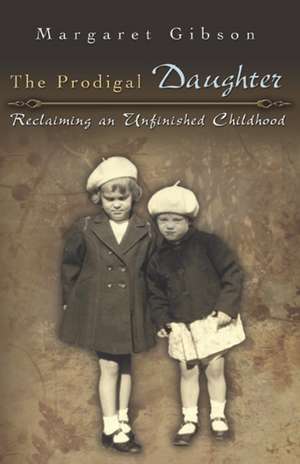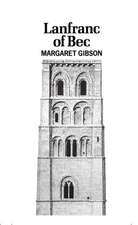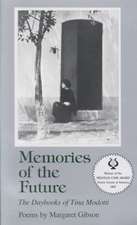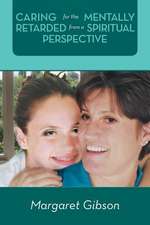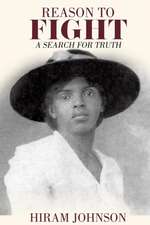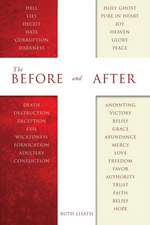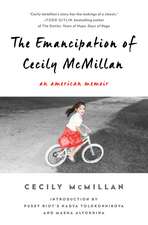The Prodigal Daughter: Reclaiming an Unfinished Childhood
Autor Margaret Gibsonen Limba Engleză Paperback – mar 2008 – vârsta ani
The 1950s and 1960s were years of shifting values and social changes that did not sit well with many citizens of Richmond, Virginia, and in particular with one conservative family, a staunchly southern mother and father and their two daughters. A powerful evocation of time and place, this memoir—a gifted poet's first book of prose—is the story of an inquisitive and sensitive young woman's coming of age and a deeply moving recounting of her reconciliation later in life with the family she left behind.
Returning us to a Cold War world marked by divisions of race, gender, wealth, and class, The Prodigal Daughter is an exploration of difference, the powerful wedge that separates individuals within a social milieu and within a family. Echoing the biblical Prodigal Son, Margaret Gibson's memoir is less concerned with the years of excess away from home than with the seeds of division sown in this family's early years. Hers is the story of a mother proud to be a Lady, a Southerner, and a Christian; of two daughters trapped by their mother's power; and of their father's breakdown under social and family expectations.
Slow to rebel, young Margaret finally flees the world of manners and custom—which she deems poor substitutes for right thought and right action in the face of the Civil Rights movement and the Vietnam War—and abandons her fundamentalist upbringing. In a defiant gesture that proves prophetic, she once signed a postcard home "The Prodigal." After years of being the distant, absent daughter, she finds herself returning home to meet the needs of her stroke-crippled younger sister and her incapacitated parents.
In this tale of homecoming and forgiveness, death and dying, Gibson recounts how she overcame her long indifference to a sister she had thought different from herself, recognizing the strengths of the bonds that both hold us and set us free. Interweaving astute social observations on social pressures, race relations, sibling rivalry, adolescent angst, and more, The Prodigal Daughter is a startlingly honest portrayal of one family in one southern city and the story of all too many families across America.
Returning us to a Cold War world marked by divisions of race, gender, wealth, and class, The Prodigal Daughter is an exploration of difference, the powerful wedge that separates individuals within a social milieu and within a family. Echoing the biblical Prodigal Son, Margaret Gibson's memoir is less concerned with the years of excess away from home than with the seeds of division sown in this family's early years. Hers is the story of a mother proud to be a Lady, a Southerner, and a Christian; of two daughters trapped by their mother's power; and of their father's breakdown under social and family expectations.
Slow to rebel, young Margaret finally flees the world of manners and custom—which she deems poor substitutes for right thought and right action in the face of the Civil Rights movement and the Vietnam War—and abandons her fundamentalist upbringing. In a defiant gesture that proves prophetic, she once signed a postcard home "The Prodigal." After years of being the distant, absent daughter, she finds herself returning home to meet the needs of her stroke-crippled younger sister and her incapacitated parents.
In this tale of homecoming and forgiveness, death and dying, Gibson recounts how she overcame her long indifference to a sister she had thought different from herself, recognizing the strengths of the bonds that both hold us and set us free. Interweaving astute social observations on social pressures, race relations, sibling rivalry, adolescent angst, and more, The Prodigal Daughter is a startlingly honest portrayal of one family in one southern city and the story of all too many families across America.
Preț: 189.41 lei
Nou
Puncte Express: 284
Preț estimativ în valută:
36.25€ • 37.74$ • 30.63£
36.25€ • 37.74$ • 30.63£
Carte tipărită la comandă
Livrare economică 08-22 martie
Preluare comenzi: 021 569.72.76
Specificații
ISBN-13: 9780826217837
ISBN-10: 0826217834
Pagini: 216
Ilustrații: 10 illus.
Dimensiuni: 152 x 229 x 20 mm
Greutate: 0.31 kg
Ediția:First Edition
Editura: University of Missouri Press
Colecția University of Missouri
ISBN-10: 0826217834
Pagini: 216
Ilustrații: 10 illus.
Dimensiuni: 152 x 229 x 20 mm
Greutate: 0.31 kg
Ediția:First Edition
Editura: University of Missouri Press
Colecția University of Missouri
Recenzii
“Margaret Gibson has plumbed silence and secrets, class and consciousness to produce this exquisite jewel of a memoir. The Prodigal Daughter is as much a portrait of the artist as a young girl as it is a meditation upon the way art can come from calamity—sometimes, as here, producing a final, hard-won kind of grace. This is a poet’s book, with rigorous, beautiful language; indelible images (oh Lord, the old lady in the red kimono!), and insights that took my breath away.”—Lee Smith, author of The Last Girls
“Margaret Gibson’s memoir is a vivid account of a child of the South who feels both estranged from and entrenched in southern culture. She makes us care about this young girl who, with energy and imagination, struggles to find her own mind and heart in a time of civil rights ferment and religious change. Gibson’s prose is impeccable, her portrayal of characters precise, giving the reader a glimpse of historical change through the eyes of a sensitive and insightful girl. The transition from child moving toward adulthood to child assuming responsibility for her own aging parents and a disabled sister is plausible, poignant, and instructive.”
—Elizabeth Cox, author of The Slow Moon
—Elizabeth Cox, author of The Slow Moon
“Margaret Gibson's The Prodigal Daughter is a lovely memoir, rich with family history, vivid details, and a lively sense of storytelling. It is a moving story of self-discovery and awareness within a complex family portrait.”—Jill McCorkle, author of The Cheer Leader
“Margaret Gibson's evocation of urban southern society in the 1950s is so on target it's scary. This is a brilliant book.”
—Shannon Ravenel, cofounder of Algonquin Books
—Shannon Ravenel, cofounder of Algonquin Books
“This is a remarkable book. The matters that it embodies, and Margaret Gibson's insight and intelligence in identifying their presence, make this memoir as readable an evocation of a time and place as I've ever come across. This portrait of the artist as a young Virginian is rich in nuance, psychologically astute, and totally honest, without pose or pretense.”—Louis Rubin, author of Where the Southern Cross the Yellow Dog: On Writers and Writing
“With the fine line drawing of an acute novelist, Margaret Gibson has given us not only an enthralling memoir of family portraits but also a powerful evocation of history. The world of her story is the genteel impoverished white South on the cusp of the great change of civil rights—a story too little told from this vantage point and with such unguarded candor. She tells it with integrity and heart, but always with fierce clarity. I laughed, I sighed, I was there. A remarkable achievement.”
—Patricia Hampl, author of I Could Tell You Stories: Sojourns in the Land of Memory
—Patricia Hampl, author of I Could Tell You Stories: Sojourns in the Land of Memory
Notă biografică
Margaret Gibson is the author of nine books of poetry, most recently Icon and Evidence, Autumn Grasses, and One Body. She is Professor Emeritus of English at the University of Connecticut and lives in Preston, Connecticut.
Descriere
This gifted poet’s memoir is the story of an inquisitive and sensitive young woman's coming of age and a deeply moving recounting of her reconciliation later in life with the family she left behind. Hers is the story of a mother proud to be a Lady, a Southerner, and a Christian; of two daughters trapped by their mother's power; and of their father's breakdown under social and family expectations. Slow to rebel, young Margaret finally flees the world of manners and custom—which she deems poor substitutes for right thought and right action in the face of the Civil Rights movement and the Vietnam War—and abandons her fundamentalist upbringing. After years of being the distant, absent daughter, she finds herself returning home to meet the needs of her stroke-crippled younger sister and her incapacitated parents.
